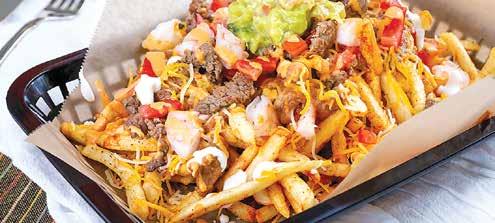
4 minute read
Food truck phenomenon
Food truck phenomenon— phenomenal! by Nick Nunes
The modern world is moving swiftly towards minimalism. Fast, effective, efficient, other adjectives that we’re in too much of a hurry to stamp out! Food trucks aren’t new, but you would be well off the mark if you didn’t realise that their proliferation has truly taken off in the 21st century, especially the last few years.
The world over has been blessed with the explosion of the street food phenomenon. There are countless shows about street food, food trucks, quick set-up stalls, and all forms of mobile food purveyors for the modern person on the go.
Barbados is no stranger to the fast-paced foodie world. Though tourism is currently the largest industry in the island, it wasn’t always the case. For that matter, mobile munchie mongers have been a part of the Barbadian landscape for more than 50 years.
Nearly half a century ago, Sue Walcott of Waterfront Cafe started travelling the island and selling food out of the back of her vehicle. Her case is the opposite of the way food trucks really started to take off in the 21st century. She started with a mobile food operation and grew it into a highly popular restaurant. They have sadly since closed its doors due to the current climate.
According to Barbados.org, “Barbados has had a culture of travelling kitchens and food vans for decades. Long before tourism became an industry in Barbados, cooks carried meals to workers on the job and to homes, cricket fields and places where people gathered. Home cooking predated sandwich boxes and Barbadians (Bajans) have always enjoyed the arrival of the food van with hot plates of delicious home-cooked ‘peas ‘n rice’ and macaroni pie.”
The idea of mobile food stretches back centuries across the globe. The ability to provide food on the go and go to where that food is most needed, could be considered a form of convergent evolution, albeit social evolution rather than biological. Convergent evolution is when similar characteristics pop up separately and unrelated to one another.
One of the first recorded instances of a “food truck” can be traced back


to the American West. A Texas cattle rancher in the 1860s by the name of Charles Goodnight retrofitted a sturdy old United States Army wagon with interior shelving and drawers, and stocked it with kitchenware, food, and medical supplies. This was to feed his men as they travelled great distances driving cattle from state to state.
Goodnight thus invented the “chuck wagon”. He stocked his converted caravan with dried beans, coffee, cornmeal, greasy cloth-wrapped bacon, salt pork, beef, usually dried or salted or smoked, and other easy-topreserve foodstuffs.
At the same time in the Northeast of America, a food vendor named Walter Scott cut windows in a small covered wagon and parked it in front of a newspaper office in Providence Rhode Island.
Over 100 years later, the Great Recession saw the closing of restaurants and chefs downsizing from brick and mortar establishments in favour of mobile purveyance of their culinary creations. In 2014, Jon Favreau’s movie Chef premiered about a chef that loses his popular restaurant and opens up a food truck to even more soaring popularity.
Today, it is estimated that food trucks serve 2.5 BILLION people EVERY DAY! In Barbados, before the end of the COVID lockdown, a new phenomenon started to take shape just behind the gas station at the bottom of Rendezvous Hill. The Worthing Square Food Garden has taken full form to fantastically offer a court of creative culinary convergence with around 15 food trucks or mobile stalls emphatically enhancing the area.
Whether you’re thinking of Cuzz’s cutters on Pebbles Beach or one of the nigh innumerable food vans that continue to proliferate across the island, mobile food mania is continuing to sweep Barbados. The best part about the food truck phenomenon is the variety that comes along with their convenience.
Italian, Arabic, Venezuelan, Jamaican, Trinidadian, Guyanese, and especially Bajan are all eatery options offered through the ubiquity of food truck finds. There are even specifically vegetarian and vegan options out there waiting to be indulged in.
Food pop-ups are also becoming a nuanced aspect of the culinary culture of Barbados. This isn’t simply catering, these are special events where chefs of all calibre turn up to unusual places to showcase their diverse talents and engineer an experience unlike any other.
Once in a while, Johann Callender’s Barbados Smokehouse pops up at the Dreadhop Brew House to delight beerfilled bellies with smoked brisket and other brilliant bites for a single night. Scott Ames’ Bento Box, though they now have a brick and mortar base restaurant, is also known to pop around the island once in a while to offer singular and spectacular events in sushi satiation. Keeping an eye on social media is now one of the best ways to pinpoint the pulse of gastronomic experience and adventure in the island.
The brilliance of the mobile food world restlessly resides in the creativity that comes from the ingenuity of entrepreneurial creativity—the chefs that find a way.
From sno-cone men on their icicle bicycles to bakeries with brakes and everything in between. The mobile food phenomenon has a storied history and is seeing the most rapid evolution of its kind since the inception of the idea.
Meals on wheels certainly isn’t a novel idea, but the extremes to which the food truck phenomenon has exploded is certainly an aspect that should be an expected experience for any foodie fiend looking to find hidden gems on their unending adventures in locating awesome eats.











